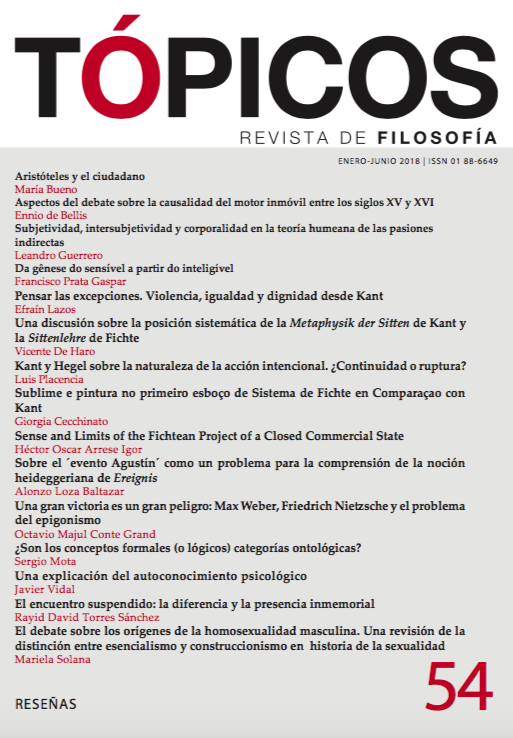Artículos
Publicado 2017-11-11
Palabras clave
- ética de Kant,
- ética de Fichte,
- formalismo,
- ética material,
- impulso natural
- impulso moral,
- teoría kantiana de la virtud y el carácter ...Más
Cómo citar
Romo, V. de H. (2017). Una discusión sobre la posición sistemática de la Metaphysik der Sitten de Kant y la Sittenlehre de Fichte. Tópicos, Revista De Filosofía, 54, 147-169. https://doi.org/10.21555/top.v0i54.862
Resumen
Resumen: La posición sistemática de la Metafísica de las costumbres de Kant y en concreto de su segunda parte, la Doctrina de la virtud, es análoga a la del Sistema de la doctrina de las costumbres según los principios de la Doctrina de la Ciencia de Fichte. Sin embargo, en dicha obra, Fichte califica la ética kantiana de “formalista” y pretende que la suya es más concreta y aplicable por su teoría de la conciliación entre el impulso natural y el impulso moral. En este artículo se explica y discute dicha postura de Fichte, mostrando que la crítica a Kant es injusta, dado que precisamente la Doctrina de la virtud ofrece, de un modo metódicamente diverso pero sólido y coherente con la ética de la autonomía, la “ética material” kantiana.Referencias
- De las obras base para este texto, he usado las siguientes versiones originales y traducciones:
- - Fichte, Johann Gottlieb, Das System der Sittenlehre nach den Principien der Wissenschaftslehre (SL), Jena/Leipzig, C. E. Gabler, 1798. Cito según la edición de la Academia de las Ciencias de Baviera, bajo la dirección de Reinhard Lauth (tomo 5, serie I). Las citas textuales las tomo de la traducción de Jacinto Rivera de Rosales, Madrid, Akal, 2005. (Citado como SL)
- - Kant, Immanuel, Metaphysische Anfansgründe der Tugendlehre (Metaphysik der Sitten. Zweiter Teil), neu herausgegeben von B. Ludwig, mit einer Einführung >Kants System der Pflichten in der Metaphysik der Sitten< von Mary Gregor, Felix Meiner Verlag, Hamburg, 1990. Consulto la traducción de A. Cortina y J. Conill, Tecnos, Madrid, 1989. Citado como MS según la edición de la Academia (AA 06). El resto de las obras citadas de Kant son también citadas según la edición de la Real Academia Prusiana de Ciencias (Kant’s Gesammelte Schriften herausgegeben von der Königlich Preuβischen Akademie der Wissenschaften, Berlin, 1900 y ss), actualmente Academia Alemana de Ciencias, y con las abreviaturas usuales en Kant-Studien:
- Anth- Anthropologie in pragmatischer Hinsicht (AA 07) IaG-Idee zu einer allgemeinen Geschichte in weltbürgerlicher Absicht (AA 08) KpV-Kritik der praktischen Vernunft (AA 05) KU-Kritik der Urteilskraft (AA 05) MAM-Mutmaßlicher Anfang der Menschengeschichte (AA 08)
- RGV- Die Religion innerhalb der Grenzen der bloßen Vernunft (AA 06).
- V-Mo/Collins- Vorlesung zur Moralphilosophie (el manuscrito de Collins, completado por Menzer a la luz del manuscrito de C.C. Mrongovius) (AA 27)
- Secundaria
- Aristóteles (1988) (citado como EN): Ética Nicomaquea, Ética Eudemia, Madrid, Gredos.
- Baum, Manfred (2013). “Prior Concepts of the Metaphysics of Morals“ en Kant´s Tugendlehre: a Comprehensive Commentary (Andreas Trampota, Oliver Sensen, Jens Timmermann, eds.), Berlín, Walter de Gruyter.
- Baxley, Anne Margaret (2010). Kant's Theory of Virtue: The Value of Autocracy, New York, Cambridge University Press.
- Betzler, Monika (ed.) (2008). Kant ́s Ethics of Virtue, Berlin, Walter de Gruyter.
- Breazeale, Daniel (2015). “Der systematische Ort der Sittenlehre Fichtes” en Fichtes System der Sittenlehre: ein kooperativen Kommentar (hsg. von Jean-Christophe Merle und Andreas Schmidt), Frankfurt am Main, Vittorio Klostermann, pp. 267-293
- Denis, Lara (2009). Kant ́s Metaphysics of Morals: A Critical Guide, New York, Cambridge University Press.
- Gregor, Mary J. (1963). Laws of Freedom, A Study of Kant ́s Method of Applying the Categorical Imperative in the Metaphysik der Sitten, Oxford, Blackwell.
- Herman, Barbara (2007). “Making Room for Character”, en Moral Literacy, Cambridge - Massachussetts, Harvard University Press, pp. 1-28.
- Maesschalck, Marc (2015) “Die Lehre von den bedingten Pflichten (19-21)” en Fichtes System der Sittenlehre: ein kooperativen Kommentar (hsg. von Jean-Christophe Merle und Andreas Schmidt), Frankfurt am Main, Vittorio Klostermann, pp. 157-182.
- Munzel, G. Felicitas (1999). Kant ́s Conception of Moral Character: the critical Link of Morality, Anthropology and Reflective Judgement, Chicago, University of Chicago Press.
- Schadow, Steffi (2013). Achtung für das Gesetz. Moral und Motivation bei Kant, Göttingen, Walter de Gruyter.
- Schwember, Felipe (2012). “Libertad, corporalidad, impulso y ley moral en la Doctrina de las costumbres de Fichte”, en Oikeiosis and the Natural Basis of Morality: from classical Stoicism to Modern Philosophy (A. Vigo, ed.), Hildesheim, Georg Olms Verlag.
- Schick, Friedrike (2015). “Vermittlungen zwischen Natur und Freiheit- der Naturtrieb in ⎎8 des Systems der Sittenlehre”, en Fichtes System der Sittenlehre: ein kooperativen Kommentar (hsg. von Jean-Christophe Merle und Andreas Schmidt), Frankfurt am Main, Vittorio Klostermann, pp. 75-92.
- Schmidt, Claudia, M. (2005). “The Anthropological Dimension of Kant´s Metaphysics of Morals”, en Kant-Studien 96. Jahrg. Walter de Gruyter, pp. 8-81.
- Sherman, Nancy (1997). Making a Necessity of Virtue, New York, Cambridge University Press.
- Tugendhat, Ernst (1997), Lecciones de Ética, trad. De L.R. Rabanaque, Barcelona, Gedisa.
- Vigo, Alejandro, "Conciencia moral y destinación del hombre. La radicalización de un motivo kantiano en el pensamiento de Fichte“ (20011), en In umbra inteligencia: Estudios en homenaje al Prof. Juan Cruz Cruz, (A. L. González- Ma. I. Zorroza, eds.), Pamplona, EUNSA, pp. 873-894.
- Wilson, Holly L. (1997) “Kant´s Integration of Morality and Anthropology”, en Kant-Studien 88 Jahrg., W. De Gruyter, pp. 87-104.
- Wood, Allen (1999). Kant´s Ethical Thought, New York, Cambridge University Press,.
- Wood, Allen (2015) “Von der Natur zur Freiheit (System der Sittenlehre ⎎⎎9-13)”, en Fichtes System der Sittenlehre: ein kooperativen Kommentar (hsg. von Jean-Christophe Merle und Andreas Schmidt), Frankfurt am Main, Vittorio Klostermann, pp.93-108.







